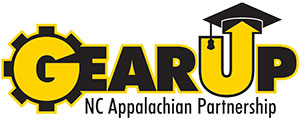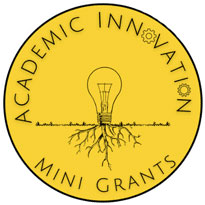
 Academic Innovation Mini (AIM) Grants are designed to support individual and school passion projects aimed at improving academic performance through innovative classroom experiences that engage, inspire, enhance, and motivate student learning.
Academic Innovation Mini (AIM) Grants are designed to support individual and school passion projects aimed at improving academic performance through innovative classroom experiences that engage, inspire, enhance, and motivate student learning.
Do you have an innovative project idea?
AIM Grants are designed to support individual and school passion projects aimed at improving academic performance through innovative classroom experiences that engage, inspire, enhance, and motivate student learning. Proposals may request funding in the $2,500 - $8,000 range.
All applications should demonstrate a direct student impact through relevant and meaningful instructional experiences. All applications should have a positive correlation to student success and GEAR UP goals.
Applications for the 2026-2027 year will open in March, 2026. Attendance at one of the information sessions is required to access the application. Please visit bit.ly/AIMINFOSESSIONS for more information.
Eligibility
- Eligible teachers, administrators, coaches, or counselors are encouraged to apply. It is required that any interested party communicate their ideas with their GEAR UP Coordinator to ensure eligibility as well as alignment between the school's innovation goals and GEAR UP grant goals and compliance measures.
- It is also the responsibility of an awarded district to notify Appalachian GEAR UP if any awarded educators leave the school or district. If funds have been spent, then it is the responsibility of the school to carry out the responsibilities of the grant award.
- Must serve current cohort of students and/or staff (District Staff, Teachers, Administrators, and Counselors)
- Funding must be utilized to serve the above audiences (Community Partners can Co-Author)
- Grant proposals must meet all compliance components
- Applicants must present their proposals at the ExP=O Pitch Competition while attending the 2026 Academic Innovation Conference.
Awardees will be notified by September and be eligible to implement their award over the course of one school year (September 2026-May 2027).
Questions?
2025-2026 Awardees
Donna Duncan and Christy Arrowood
Burke County Schools
$10,000 Award
Project Title: Next Gen Educators Powered by Mentorship
Abstract: Our goals are to better support Residency License (RL) and Beginning Teachers (BT), years 1 through 3, with limited experience in the classroom to build highly effective teaching and learning. In this grant, recipients wish to do the following:
To build capacity in our teachers, we want to minimize the extra stressors that come with the profession so that we can retain teachers. This capacity strengthens schools and maintains sustainability when there is less turnover and higher retention. Social and emotional connections are easier to make when students build relationships with teachers who stay in the buildings. With more support, educators can create unit and lesson plans that increase student engagement, thereby improving retention.
To provide one-on-one foundational skills with a Residency Support Coach (RSC) to elaborate on standards-based lesson planning, create social emotional learning activities, and model classroom management strategies with 4 residency licensed teachers (2 per semester). The RSC will observe, visit, and partner with the RL teachers for 8 half days. This will strengthen the classroom teacher and student learning within the first 8 weeks of the semester. Creating a positive learning environment is instrumental in increasing student retention and engagement. When teachers can support students socially and emotionally through consistent classroom management techniques and various activities, they will be more receptive to learning. The first 8 weeks are a crucial time in helping teachers establish presence in the classroom.
To establish a supporting network of NextGen teachers in the district, 10 BT and 4 RL teachers, selected from grades 9-12 based on beginning status and principal nomination. In addition to the established school support, teachers will have an opportunity to observe, collaborate with others in different content or interdisciplinary areas, increasing partnership with veteran teachers across the district. We want to provide substitute funding to allow the teacher to visit classrooms outside of their school building. This allows teachers to provide their own professional development learning, focusing on their own classroom’s needs.
To focus on reflection and future impact, teachers will share best practices and instructional strategies in a culminating event. This symposium will invite all grant recipients to collaborate, disseminate, gain new knowledge, and create an action plan for future steps based on their observations and valuable insights. This will be by the four High School Instructional and Residency Support Coaches.
To capitalize on accessible resources, we want to provide teachers with quick readable documents to support their individual needs and provide necessary innovative teaching methods that foster creativity and critical thinking. The quick reference cards will provide teachers with guides that will answer daily questions that arise in regards to planning, classroom management, social/emotional development, SEL support, designing and using essential questions, student discourse, differentiation, and increasing rigor.
To build a sustainable support library, Instructional Coaches want to use funding to purchase a variety of quick reference cards on the above topics. This library will allow us to check out these cards to teachers as needed when they have questions regarding various needs.
Brittany Perry and Autumn Chamberlain
Ashe County High Schools, Ashe County
$10,000 Award
Project Title: Leaders in Bloom: Cultivating Change by Nourshing the Roots
Abstract: When compacting the aftermath of COVID 19 with Hurricane Helene, Ashe County Schools has seen a dramatic increase in homelessness, dropout rates, and chronic absenteeism. “Leaders in Bloom: Cultivating Change By Nourishing the Roots” proposes a two prong approach to addressing the barriers for students across Ashe County Schools in grades 9th through 12th. First, by informing and training teachers to be active participants in identifying and responding to students who exhibit and experience life circumstances which put them at higher risks of dropout, truancy issues, and high stress home lives, we can approach data in a preventative manner and not solely reactive. Second, we will work with students who currently fall within these categories to teach perseverance and resilience. Within this framework, we address our students, the leaders in bloom, and the educators who work with them daily, the root system.
Leaders in Bloom is an active, student-centered program that aims to empower high school youth to grow in leadership while learning life skills through gardening. Leaders in Bloom is a two-semester Farm to School curriculum integrating gardening, nutrition, sustainability, and youth leadership. Through hands-on learning and local community collaboration, students gain knowledge, confidence, and a strong sense of connection to their school, food, and community.
Many students in our district face limited access to experiential education, particularly in outdoor, environmental, and food system-related learning. These gaps contribute to lower engagement and missed opportunities for career exploration, wellness, and civic involvement. Leaders in Bloom addresses these disparities by using the school garden as a living classroom and platform for leadership development.
Leaders in Bloom strives to educate, empower, engage and enrich our students through gardening in a small group setting. Students will learn about sustainable gardening, healthy foods, and local community farms. Leaders will empower youth leadership and cultivate a climate of school connection. Through cultivating positive school connections and community connection, students will attend school at higher rates and graduate on time with their cohort. Students will also become engaged with local farmers, and community agencies, therefore leading to feeling a connection to community. Families will also be encouraged to be engaged with their student throughout the gardening process. The various activities within the curriculum will integrate art, math, history, science, and SEL skill building; thus, giving the students an enriching experience on all areas of academia and mental health.
Leaders in Bloom will meet both Fall and Spring semesters of the school year. Each week the groups will complete activities such as Intro to Farm to School, soil science, garden planning, seed starting, composting, nutrition, and a final project. The curriculum will also have SEL skills that build on each other every week. Students will learn team-building, growth mindset, gratitude, empathy, health awareness, leadership, and self-reflection. During the school year, students will have opportunities for farm and community trips. In the Spring semester, there will be a final project that each group will complete and present for their families, school, and community. Students at each school will be encouraged to join by participating in polls, recipe collection, composting, and attending the final project presentations.
Success in Leaders in Bloom will be measured through student reflections, student journals documenting learning and personal growth, Pre/Post Surveys on knowledge of food systems, community, and SEL skills, observation rubrics of student collaboration and leadership, community feedback from event attendees and partners, and photo documentation of garden and project progress.
Leaders in Bloom will be sustainable by providing annual training of student garden leaders to ensure success each year for the new cohort, continuing partnerships with local community organizations and farms, volunteer and family engagement.
Nourishing the Roots looks at the teacher lens and promotes cultivating a system of support that can both identify students who may be experiencing barriers to learning as well as equip them with the necessary instructional pedagogy and knowledge of higher levels of support the students may need. Trainings will be provided to faculty and staff within Ashe County High School and Ashe County Early College through a research-based, immersive approach. Training kits will be designed and built by the facilitation team, along with partners in the mental health field and higher education realms, to be transit accessible for on-site trainings. Additionally, work within the Appalachian State GEAR UP partnership with THRIVE will provide entry level training to all staff who work with students. The facilitation team will provide follow-up PDs and trainings as needed to high concentration core staff and faculty throughout the year.
Together, we will ensure that the whole ecosystem is thriving and blooming.
Tonya Denny and Kathy Evans
Ashe County High School, Ashe County
$10,000 Award
Project Title: Connecting Languages, Families, and Futures Lending Library
Abstract- In Ashe County, high school non-English proficient students face unique challenges in STEM education as they simultaneously navigate content knowledge and language acquisition. Research consistently shows that vocabulary acquisition—particularly specialized academic terminology—remains the greatest barrier to non-English proficient student success in STEM fields. This project addresses this critical need through a district-wide initiative that leverages visual learning strategies, hands-on experiences, and family engagement.
The STEM Bridges program will create a sustainable system of shareable resources that circulate among Ashe County's district non-English proficient learners and instructors, and families. At its core, this initiative establishes a library of portable STEM kits containing visual learning tools, technology resources, and materials specifically designed to make abstract scientific vocabulary concrete and accessible to build language acquisition.
Key components include:
- Portable STEM Learning Stations: Durable, transportable kits containing digital microscopes, engineering materials, scientific models, and mathematics manipulatives—all paired with bilingual visual vocabulary resources that ML teachers can check out for classroom use.
- Visual Vocabulary Development: Comprehensive bilingual resources that pair STEM terminology with visual representations, creating multiple pathways to understanding complex concepts while building essential academic language.
- Family Engagement Workshops: Parent nights that invite non-English proficient student families to engage with the same materials their students use in classrooms, fostering home-school connections while providing meals and community-building opportunities.
- Professional Collaboration Network: A structure for Ashe County's non-English proficient student specialists, content teachers, and media coordinators to share best practices for visual vocabulary instruction across the district.
The program's distribution model maximizes resource efficiency by centralizing high-quality materials that can be shared across schools rather than duplicating limited resources. All materials are selected for durability and multi-year use, ensuring sustainability beyond the grant period.
By focusing on visual and contextual vocabulary acquisition, STEM Bridges directly addresses the most significant obstacle non-English proficient students face in STEM education. When technical vocabulary becomes accessible, content mastery follows, opening doors to advanced coursework and future careers. Additionally, by engaging families in the learning process, the program strengthens support systems that research shows are crucial for non-English proficient student success.
This $10,000 investment has the power to reach up to 100 high school non-English proficient students and their families annually by fostering access and increasing opportunities in substantive STEM learning experiences. Most importantly, it will build lasting bridges between languages, classroom learning, home environments, and broadening future career opportunities for Ashe County's non-English proficient students.
Jessica Esposito
River Bend Middle School, Catawba County
$5,000 Award
Project Title: Code the High Seas: Sphero Pirates Set Sail
Abstract: At River Bend Middle School, we are launching an after school robotics club, Code the High Seas: Sphero Pirates Set Sail. to engage students in hands-on, inquiry-based STEM learning through coding and competitive robotics. This innovative program is designed to increase student access to real-world applications of technology and engineering while supporting GEAR UP goals related to math proficiency, student engagement, and postsecondary aspirations. Our club will provide students, especially those from historically underrepresented and at-risk backgrounds, with consistent, engaging opportunities to design, code, and compete using Sphero BOLT robots and LEGO Spike Prime kits.
While our school has secured seven LEGO Spike Prime kits through a district STEM grant, we do not currently have all the equipment needed to participate in both district robotics competitions, including the high-interest Sumo Fest event, which requires Lego Spike Prime kits. With this grant, we are seeking funding to purchase a full classroom set of Sphero BOLT robots and supplemental LEGO Spike Prime kits to ensure all students have the tools needed to fully participate, collaborate, and innovate. These resources will remove barriers to access for students who may not otherwise have exposure to competitive robotics, coding, or STEM careers.
This club is more than just a place to build and battle robots, it is a launchpad for curiosity, collaboration, and confidence. Students will work in teams to complete coding missions, engineer bots for competition, and develop 21st-century skills such as problem-solving, teamwork, iteration, and communication. By intentionally recruiting students from diverse learning backgrounds, including EC students, ELLs, and those with limited access to enrichment activities, we aim to close opportunity gaps and inspire a more inclusive generation of STEM learners.
The robotics club will meet weekly after school and serve as a space for students to explore robotics in a supportive, team-based setting. Students will participate in two district-wide STEM competitions where they will apply their knowledge in high-energy, real-world challenges, including battles at Sumo Fest. The club aligns with GEAR UP KPIs including Pre-Math 1 Success, and High Educational Aspiration by keeping students engaged in meaningful learning that connects classroom content with career readiness.
Sustainability is embedded in this proposal. The club will continue each year with the same core materials, with ongoing opportunities to recruit new members and expand offerings based on student interest. Lessons, challenges, and competitive prep activities will be shared with other STEM educators across the district and at the regional GEAR UP conference to support replication and scaling.
By funding this proposal, we will empower our middle schoolers to become confident, capable coders and collaborative problem-solvers who are ready to navigate the ever-changing waters of STEM education. Together, we will code the high seas and set sail for a future filled with opportunity.
Nikki Eason
Ashe County High School, Ashe County
$5,000 Award
Project Title: The Outdoor Exchange Classroom
Abstract: Ashe County High School will use this funding to develop a collaborative, student-driven outdoor learning environment that will serve as both a functional educational space and a place for student well-being. In an increasingly digital and fast-paced world, this space will provide students with hands-on learning opportunities, fresh air, and a peaceful place to reflect, recharge, and reconnect—with nature, with each other, and with their studies.
This project brings together four Career and Technical Education (CTE) programs—Agriculture, Construction, Art, and Health Science—in a unique, interdisciplinary effort. Students will not only benefit from the finished space but will also be directly involved in its design and construction, giving them ownership of the process and providing valuable real-world experience. Each CTE area will play a vital role:
Agriculture students will plan, install, and maintain gardens, native plant beds, and possibly small-scale raised beds or pollinator habitats. This component supports sustainability, environmental stewardship, and horticultural skills.
Construction students will design and build seating areas, raised planters, pathways, a "porch swing", and shade structures—allowing them to apply technical skills in a meaningful, lasting way.
Art students will create murals, sculpture, and other installations to make the space visually engaging, culturally relevant, and welcoming for all students.
Health Science students will incorporate wellness components—such as mindfulness signage, walking path ideas, or simple exercise stations—promoting physical and mental health.
The outdoor learning space will be used for class meetings, hands-on lessons, group projects, and individual reflection time across all subject areas. It will be especially valuable for students who thrive in non-traditional learning environments and will serve as a pilot model for community-connected, interdisciplinary education.
In addition, this space will create meaningful student club service opportunities for FFA and HOSA members. Both the FFA chapter and the HOSA members will take an active role in the ongoing care, improvement, and educational use of the space—hosting service days, leading garden maintenance projects, and facilitating educational activities for younger students or community partners.
Our goal is to create a space that is functional, beautiful, and restorative—designed by students, for students. By involving CTE programs and student organizations like FFA in the planning and implementation phases, this project fosters career readiness, teamwork, and a deep sense of accomplishment. It also allows students to see how their classroom skills can be applied to improve their school and community.
With your support, we will transform a currently underutilized outdoor area into a vibrant, student-centered learning hub—enhancing educational opportunities and supporting the health and well-being of the entire Ashe County High School community.
